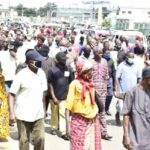
The World Bank in partnership with the federal and state governments have invested about $949m (N379.6bn at an average exchange rate of N400/$) on various erosion control projects in 23 states, the Federal Government has said.
It said the funds were spent on the Nigeria Erosion and Watershed Management Project, as some other donor agencies contributed about $9m to the fund which was used within a period of 10 years.
NEWMAP is a World Bank assisted project aimed at addressing the Nigerian gully erosion crisis in Southeastern Nigeria and land degradation in Northern Nigeria on a multi-dimensional scale.
A document obtained from the organisation in Abuja outlined the initial states in 2013 to include Abia, Anambra, Cross River, Ebonyi, Edo, Enugu and Imo.
It stated that in 2015 Delta, Oyo, Sokoto, Gombe, Plateau, Kogi and Kano were added, while in 2016 Akwa Ibom, Borno, Katsina Nasarawa and Niger joined the partnership.
Ondo, Ekiti, Kaduna and Ogun states were also added to the number of states participating in the project in 2019.
Speaking on the side-lines of the closing/valedictory ceremony and award night for the NEWMAP in Abuja on Saturday, NEWMAP’s National Project Coordinator, Salisu Dahiru, said the project had delivered on its mandate.
Asked to state the amount so far invested in the project, he said, “The first phase of NEWMAP had $500m plus two grants, one was over $3m from Global Environment Facility and another one from the Special Climate Change Funds of about $4m. All of them amounted to about $8m or $9m as grants.
“But when that $500m was approved, it was approved for only seven states and it was agreed between the Federal Government and the World Bank that if we are to increase the number of states participating in the project, then there should be additional financing.”
Dahiru added, “So when the number of participating states in NEWMAP increased from seven to 11, 15 and 19, the need to have this additional financing came up.”
He explained that with the increase in the number of states, the demand for additional sites came up and that some of the sites were really big, with the Agulu-Nanka gully erosion in Anambra among the biggest and oldest.
“Oruala in Imo State is a very huge one, Auchi in Edo State is a very big one. So these made it necessary for additional financing to be provided by the World Bank and then the bank advanced $400m,” Dahiru stated.
He added, “But with that $400m as at that time, estimates of all the gullies that needed to be rehabilitated was in excess of $1bn, so we are still left with some shortfall.
“Some states have brought sufficient counterpart funds, the Federal Government has also brought some counterpart funds, and these all together helped in ensuring that the project was implemented. But in terms of investment by states, there are investments in kind and cash.”
On his part, the Minister of Environment, Mohammed Abdullahi, stated that it was in 2012 that the Federal Ministry of Environment in partnership with the World Bank designed the NEWMAP.
“This was done with the aim of reducing vulnerability to gully erosion and other forms of land degradation in targeted watersheds, focusing on reversing and preventing further land degradation, and at the same time enhancing the livelihoods of beneficiary communities,” he stated.
Abdullahi, who was represented by an official of the FME, Atta Abdullahi, noted that the achievements of NEWMAP were in line with the goals of the Economic Recovery and Growth Plan of the Federal Government.
He said the project’s achievements were areas such as gully rehabilitation, restoration of degraded lands, urban storm-water management, climate change adaptation and resilience, water harvesting, climate smart agriculture, reforestation, biodiversity conservation, support to community health care services, job creation, sustainable livelihood initiatives, etc.
Release of counterpart funds posed challenge to NEWMAP – Expert
Commenting on the development, an environmental expert and former General Manager, NetView Enviro-Comm Limited, Isiguzo Iheanyi, said although the project impacted positively, it faced challenges with respect to the release of counterpart funds by Nigerian partners.
Copyright PUNCH.
All rights reserved. This material, and other digital content on this website, may not be reproduced, published, broadcast, rewritten or redistributed in whole or in part without prior express written permission from PUNCH.
Contact: [email protected]





